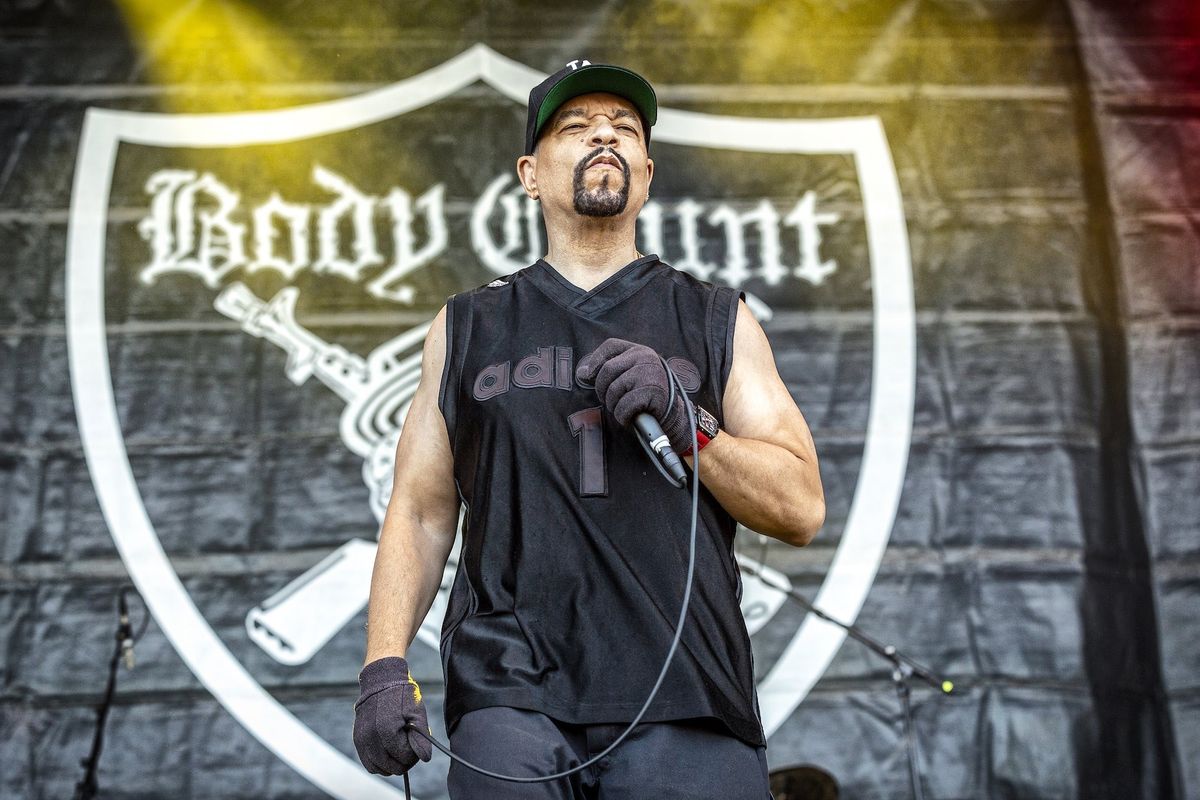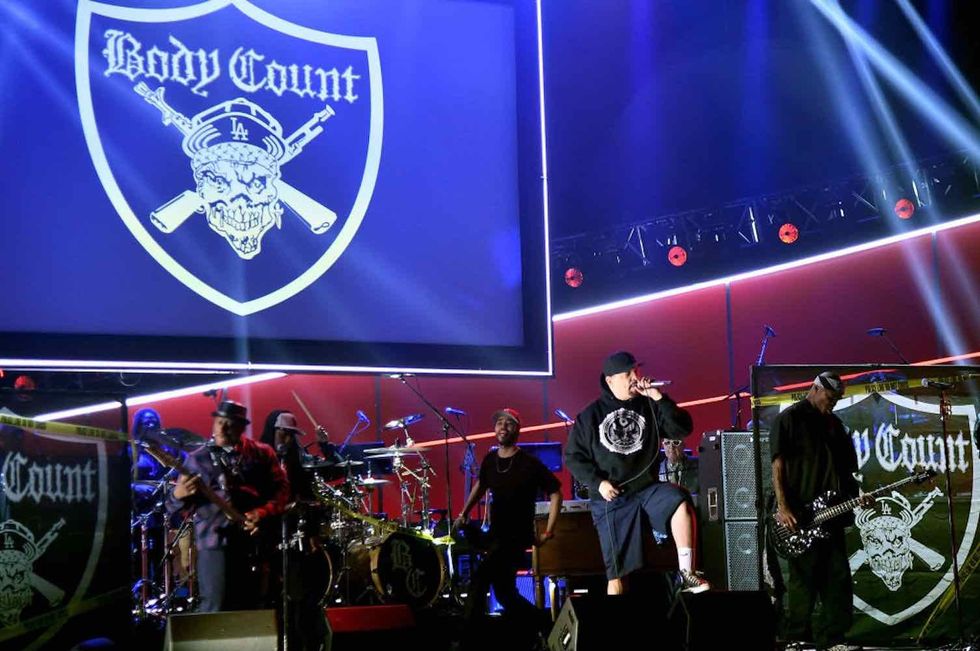
Ice-T black shirt
Photo credit: Gonzales Photo - Terje Dokken)
To continue reading
Create a free account or sign in to unlock more free articles.
By continuing, you agree to the Terms of Service and acknowledge our Privacy Policy
Register
The content is free, but you must be subscribed to Okayplayer to continue reading.
THANK YOU FOR SUBSCRIBING
Join our newsletter family to stay tapped into the latest in Hip Hop culture!
Login
To continue reading login to your account.
Forgot your password?
Please enter the email address you use for your account so we can send you a link to reset your password:

The surprise on Ice-T’s face was palpable, clearly not having had expected much from the Recording Academy. Yet sure enough, when the envelope was opened, his long-running heavy metal/hardcore punk band Body Count had won for Best Metal Performance with the song "Bum Rush." With his five-year-old daughter Chanel beaming pride beside him on the couch and his wife Coco filming his reaction, he ran through his thank yous for the Grammy pre-show ceremony livestream. When it was done, he stood up and, still stunned, exuded joy just behind his typically gruff exterior.
Ice-T had good reason to get emotional. Though not his first Grammy — he won Best Rap Performance by a Duo or Group back in 1991 for his role on Quincy Jones’ posse cut "Back on the Block" — the rap icon’s long road to his second award had been a fraught one, marked by a harrowing experience as the target of a campaign intended to defame and destroy him. Some 30 years earlier, this very same band of his made enemies of law enforcement agencies, parents groups, the American media, and the President of the United States over a song called “Cop Killer.” Now, Body Count had a damn Grammy. Furthermore, among the various positive aspects of this moment, theirs was the first win in the category’s three decade existence for a Black-fronted band comprised predominantly of Black and brown members.
The concurrent existence of the award and the group is no coincidence. By 1990 — the year the Grammys first offered a Best Metal Performance prize — the genre had gone from underground subculture to something major labels could market widely, proven by late 1980s’ commercial success stories like Metallica’s ...And Justice For All and Faith No More’s The Real Thing, which reached No. 6 and No. 11 on the Billboard 200, respectively. The harder, more extreme style of records like these noticeably diverged from the so-called hair metal sound. In 1992, the year of Body Count’s eponymous debut for Sire Records, heavy metal had mass appeal, and singles like Megadeth’s “Symphony Of Destruction” and Metallica’s “Nothing Else Matters” were included in MTV’s rotation, while breakout clips by relative newcomers Nine Inch Nails and Rage Against The Machine also received some play there.
With a recognizable frontman in Ice-T, an appearance on his RIAA gold-certified O.G.Original Gangster album, and a promotional run on the inaugural Lollapalooza tour, Body Count were in a position to benefit from this favorable climate surrounding metal. Anti-drug track “The Winner Loses” and the anti-racism single “There Goes The Neighborhood” each received music video treatment, mixing timely sociopolitical commentary with a hardcore aesthetic. Co-written with his friend and guitarist Ernie C, some of the songs such as “Evil Dick” and “KKK Bitch” utilized shock and gallows humor to get the point across, a classic move among the punk provocateurs that preceded them. “Cop Killer” fell squarely into that space, drawing upon the genuine rage and pain caused by racist policing and jarringly encapsulated by the videotaped brutalizing of Rodney King in March of 1991.
Yet the message of Body Count’s revenge fantasy as protest anthem — a staple of their Lollapalooza sets — was swiftly distorted by outsiders, including those representing the institutions the band stood squarely in opposition to. It started in June 1992, just a couple of months after the album’s release, with police advocacy and interest groups across the country calling for boycotts of Sire Records parent company Time Warner Inc. over “Cop Killer” picking up traction and attention. The move echoed those of the censorious and powerful Parents Music Resource Center some years prior, whose own Tipper Gore (the soon-to-be Second Lady) had previously fixated on Ice-T in a 1990 op-ed for the Washington Post, as well as in her related work.
Even as these efforts seemed to unintentionally drive sales, public figures in law enforcement leadership and in conservative politics soon added their voices to the boycott call, condemning Ice-T and Time Warner over the song. It being an election year, those seeking or hoping to retain office let their disapproval be known, with Vice-President Dan Quayle railing against it on the campaign trail, a chilling preview of the unsubtly racist culture war tactics now commonplace and plainly on view in today’s Trumpian GOP. Even President George H. W. Bush commented on the track, calling it “sick.” Opinion pieces about the song appeared in newspapers across the country. Protests broke out in and around Time Warner’s annual meeting that July, with no less than actor and future National Rifle Association president Charlton Heston among those aggrieved by Body Count’s very existence. Death threats against executives at the company, alongside concerns from some stockholders, apparently became an issue as well.
By the end of the month, Ice-T appeared in a press conference alongside Bob Merlis, Warner's vice president and national publicity director, to announce that new editions of the album without “Cop Killer” would be made going forward, though the 500,000 copies already shipped to stores were not being recalled.
"They’re yelling about a record that came out in March, and just yesterday the cops were killing people out in the street," Ice-T said in an August 1992 Rolling Stone interview. "They’re under the gun, and the best defense is a good offense, so what they’ve done is taken Americans’ minds and said, 'Look at this record, look at how people are treating us.' But why all this noise? Why all this protest about a record that speaks about killing cops and not protest against the cops killing kids out there in the streets?"
Even today, that decision echoes in a disturbing way. Despite streaming and digital downloads in abundance and the controversy a distant memory, the song still remains tragically absent from the Body Count album, only to be heard by those with a copy of the original edition or in an unofficial fan-uploaded capacity on services like YouTube.

A lesser artist than Ice-T might have called it quits after all that. Instead, he continued to make music, including records with Body Count, in the subsequent years. His pivot towards acting seemed a poignant if ironic counterpoint to the “Cop Killer” hysteria, particularly with his role as NYPD Detective (now Sergeant) Fin Tutuola on the long-running TV show Law & Order: Special Victims Unit. Though original members D-Roc, Beatmaster V, and Mooseman have passed, Body Count became his main musical outlet in the 2010s, with Ernie C and newer recruits Ill Will, Juan of the Dead, and Vincent Price filling out the ranks. At the band’s corresponding live concerts, “Cop Killer” stayed as a setlist staple, much to the satisfaction of audiences.
Though we now see some improvement in representation, heavy metal and hardcore punk scenes historically have not exactly been particularly welcoming spaces for Black and brown people — as artists or otherwise. This comes despite the pioneering roles played by Bad Brains and Suicidal Tendencies, the latter having previously counted Thundercat and Metallica’s Robert Trujillo in its bassist ranks. Popular enough to consistently play heavy music festivals as well as headliner tours globally in the pre-pandemic times, Body Count has served as a furious and bright welcome beacon, evidenced by the diversity found in their mosh pits.
To be seen and, yes, validated by the Best Metal Performance Grammy must feel great for Ice-T, Ernie C, and the whole crew. But it also affirms the work they’ve done, and continue to do, towards greater inclusivity for BIPOC listeners, and using metal to call out the injustices Black people face in America — whether that be "Cop Killer" or more recent records like "No Lives Matter" or "Black Hoodie" (which was nominated for Best Metal Performance at the 2018 Grammys). And after being unfairly maligned and persecuted so early in their career, earning the industry’s top prize nearly three decades later probably kicks ass, too.
—
Gary Suarez is a freelance journalist and music critic born, raised, and based in New York City. He founded the hip-hop media brand Cabbages in January 2020, beginning as a newsletter and expanding to include a namesake podcast later that same year.